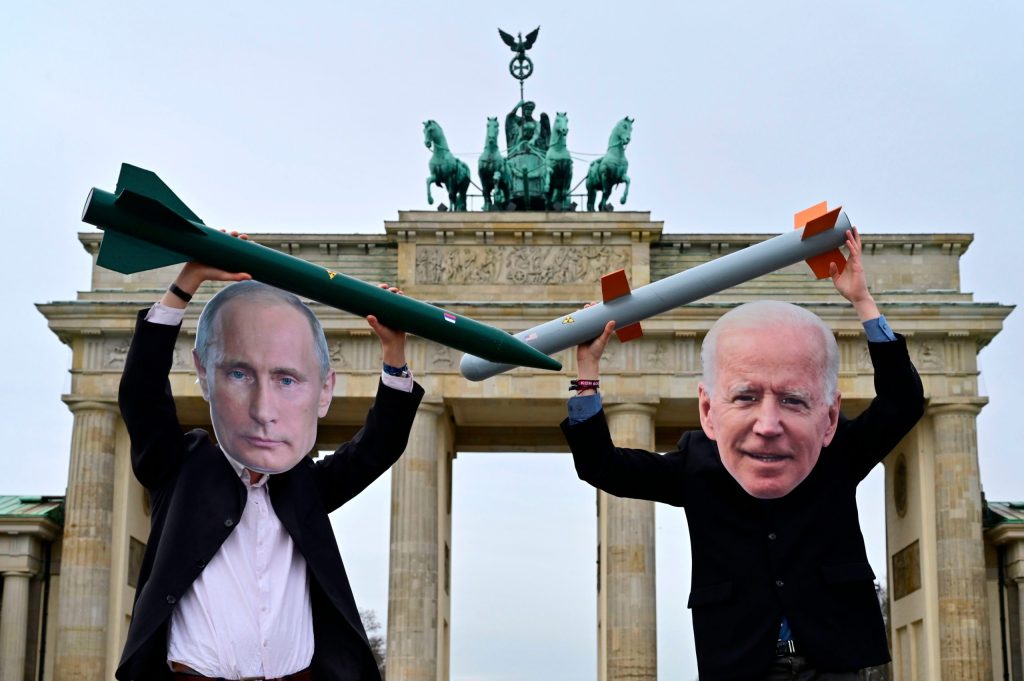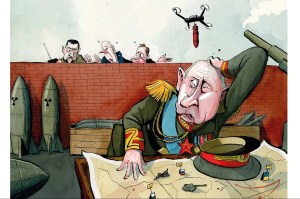In 2001, President George W. Bush stared into Vladimir Putin’s eyes and said he saw his soul. Joe Biden, on the other hand, famously claimed to have told the Russian leader, ‘I’m looking into your eyes, and I don’t think you have a soul.’
Now the new incumbent of the Oval Office might have a second chance to check again in the flesh. On Tuesday, Biden held a rare and by all accounts cordial telephone call with his counterpart in Moscow to discuss the increasingly tense situation on the border with Ukraine. For months, Kiev’s forces in the Donbass region have clashed with troops loyal to two Russian-backed breakaway republics, with numerous reports of drone strikes and civilian casualties.
Moscow has since deployed its army along the country’s eastern frontier and, as part of a surprise inspection earlier this week, the country’s defense minister said its units were combat ready and prepared to ‘ensure Russia’s military security’ in the event of an all-out conflict. The Kremlin has compared the situation to Srebrenica, the massacre of Bosnian Muslims during the breakup of Yugoslavia, now remembered as one of Europe’s bloodiest genocides since World War Two. Putin’s deputy chief of staff, Dmitry Kozak, has said the country ‘would be forced to stand up’ against a humanitarian crisis on a similar scale.
Ukraine has denied it is pursuing a renewed military offensive in the Donbass — and has invited the US-led Nato military alliance to up its presence across the country in response to claims of imminent Russian aggression. At the same time, American and EU diplomats have reiterated their commitment to Ukrainian sovereignty. Meanwhile, Kyiv claims it would have western backing were Moscow to order an invasion.
In short, the stage would appear set for a new war in Europe. But it is increasingly clear that neither Washington nor Moscow wants to risk an open confrontation between the world’s two main nuclear powers over a nation many Americans couldn’t point to on a map. The call between the countries’ leaders would seem to be the first sign both are keen to take a step back from the brink.
Biden sparked a diplomatic row with Russia last month when he agreed with an interviewer that Putin is a ‘killer’, adding that the former KGB agent would ‘pay’ for alleged meddling in the 2020 election. The comments saw Russia recall its ambassador for emergency talks, and the foreign ministry insists he will only return to his post when it sees signs of relations thawing.
But the White House appeared to be intent on changing tack this week and, much to the frustration of many commentators, Biden elected not to use the exchange to raise the case of imprisoned opposition activist Alexei Navalny. The anti-corruption campaigner was arrested on parole violation charges after flying back to the country from Berlin, where he was recuperating from what he and his doctors say was a poisoning with the nerve agent Novichok. Russia regards this as an internal issue and has repeatedly said foreign condemnations are unacceptable.
Instead, President Biden focused on safer areas of common ground like climate change and nuclear arms controls. He also pitched to Putin the idea that the two could meet in the coming weeks to settle any differences in person. The Kremlin is now reportedly considering the idea and has ordered officials to begin looking into the points Biden raised, while Finland and Austria are already vying to host the head-to-head. The summit would be the first since 2018 when former president Donald Trump pressed the flesh with the Russian premier in Helsinki. However, the meeting was marred by uproar after Trump appeared to deny Moscow meddled in the 2016 election that propelled him to power, before being forced to backtrack and insisting he misspoke.
While a bilateral conference could be the beginning of normalizing relations between the two countries, it is also a high stakes game. Forged by the fall of the Soviet Union, Biden’s foreign policy is undoubtedly more principled and ideological than Trump’s brutal pursuit of American self-interest. There are concerns in the Kremlin that the President may simply be unwilling to deal with the country as an equal, rather than from a position of strength. For Russia, a charm offensive is only worthwhile if it comes with an acknowledgement that it is still a major power and has the right to exercise influence across much of the former Soviet Union.
As a test of whether discussions have any chance of producing results, Putin is likely to want to see the removal of sanctions and a bar on Ukraine ever formally joining Nato featured on the agenda. If Washington is not prepared to consider these tough conditions, there is little to stop the Kremlin from concluding that it has nothing to gain from trying to improve relations and no harm in making them worse.
If the crisis talks go ahead as planned, Biden may still struggle to see a soul behind Putin’s eyes. But for the sake of stability in Europe, he’d do well to at least pretend he does.
This article was originally published on The Spectator’s UK website.


















